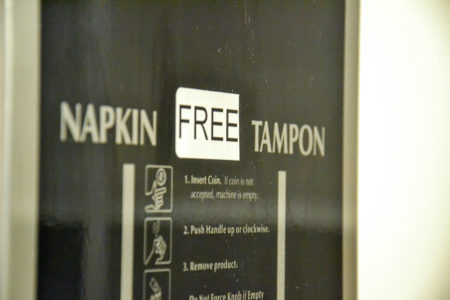
By Emma Friedlander
friedlan@grinnell.edu
As menstrual activism has become more and more of a hot button issue, Grinnell has taken action by providing free menstrual products in its academic buildings. Over the summer, machines that charged 25 cents for pads and tampons were replaced with free machines. Steps to initiate this change were taken after Rebekah Rennick ’18, frustrated with lack of access to menstrual products, picked locks on several of the machines last September. Rennick wrote an article on her actions in the Grinnell Underground Magazine and subsequently received national attention in the Huffington Post and Inside Higher Ed. Although Rennick initially faced possible punishment, the administration instead decided to implement the changes she was asking for.
“There was discussion of punishment, which didn’t end up happening, I think in part because it had gotten so much visibility,” Rennick said. “To punish me would have been a more negative perspective of the College than they would have wanted. … I think it’s something that had to go through, especially after it got picked up. … It’s really easy to not be held accountable if there’s no one watching you. And there were definitely people watching.”
After hearing Rebekah’s story, Dan Davis ’16, last year’s Student Government Association (SGA) President, decided to take action to make menstrual products free in academic buildings.
“I started talking to [President] Raynard Kington and Andrea Conner [Vice President of Student Affairs] and both were very receptive to what I was laying down,” Davis said. “They weren’t always quite sure where the money was going to come from, so that was their biggest skepticism. But both seemed to be on board for the supplying of said products. It was a little painful throughout the year — sometimes the conversation would get lost and I would have to bring it back up again. But for the most part, there was not a lot of pushback.”
Davis began conversations with Kington and Conner in late September 2015, a couple of weeks after Rennick’s story broke. The planning process continued until the end of the 2015-2016 school year, due to intermissions in the conversation and initial hesitancy from Facilities Management (FM).
“[Rick Whitney, Director of FM] wanted to know the added cost of labor,” Davis said. “The amount that people were actually taking from a machine when you had to pay for them was pretty much negligible, so FM workers wouldn’t have to take time out of their day to throw more tampons in because no one was taking them out. Now that we’re offering free tampons, that might change. He was saying there are 35 machines and if it takes 10 minutes to restock each machine twice a week, that all adds up. … FM works on union contracts, which means they have to add things to the contract.”
The greatest obstacle in the way of securing free pads and tampons was finding funds. Davis explained that all budgets are allocated a year in advance, so in order to enact swift change, SGA needed to locate free, unrestricted money. This was found in a combination of unallocated SGA and presidential funding. SGA and President Kington each paid for half of the cost of the new machines, while FM agreed to pay for future upkeep costs.
“FM received a shipment of the 35 machines April 1, 2016, and they were installed this summer,” wrote Summer White, SGA Treasurer, in an email to The S&B. “FM and SGA both contributed 7,350 dollars to the total cost of 14,700 dollars on April 11, 2016. FM agreed to cover the cost of supplies and maintenance going forward. There is no hard policy on this. It was simply a series of conversations and verbal commitments.”
Although students and administration alike are happy with this progress, they still believe there are further changes to make. SGA’s initial proposal requested a free menstrual product machine to be installed in male-gendered and non-gendered bathrooms, as well as female-gendered ones. When Davis graduated last May, they left with the impression that this aspect of the plan would be implemented as well. However, FM ultimately decided to not support this request.
“The initiative that we did not support is providing additional feminine product vending in male-gendered (multiple fixture) restrooms, where it never existed,” wrote FM director Rick Whitney in an email to The S&B. “Although we are open to providing such products in non-gendered, single-occupancy restrooms, it is atypical to do so, given the lesser volume of patrons and expense of the vending units.”
Moreover, Rennick hopes that the College takes further steps in promoting alternative menstrual products access and awareness.
“I would love to see College-subsidized alternative menstrual products. Pads and tampons don’t work for everyone, and they do have an environmental [impact],” Rennick said. “We grow up, we start menstruating, we’re given the options of pads and tampons. So many people go their entire lives without realizing there are many other options that could make them feel comfortable and connected to their bodies, instead of feeling such senses of abjection.”


























































